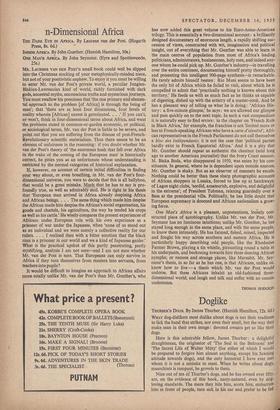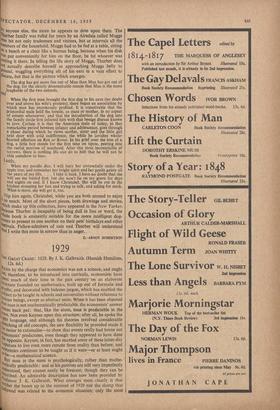Doglike
THURBER'S DOGS. By James Thurber. (Hamish Hamilton, 12s. 6d.) WHAT dog-dislikers most dislike about dogs is not their readiness to lick the hand that strikes, nor even their smell, but the way they make man in their own image : devoted owners get so like their dogs.
Here is this admirable fellow, James Thurber: a delightful draughtsman, the originator of 'The Seal in the Bedroom' and 'The Secret Life of Walter Mitty' (for either of which I would be prepared to forgive him almost anything, except his fawning attitude towards dogs), and the only humorist I have ever met whom it is not a mistake to meet. When he writes about dogs, masochism is rampant, he grovels to them.
Nine out of ten of Thurber's dogs, and he has owned over fifty, are, on the evidence of this book, nasty-natured, even by dog- loving standards. The more they bite him, scorn him, embarrass him in front of people, turn sick in his car and prefer to be fed Y anyone else, the more he appears to dote upon them. The Thurber family was ruled for years by an Airedale called Muggs 410 bit not only tradesmen and visitors, but at intervals all the 'embers of the household. Muggs had to be fed at a table, sitting Pa a bench or a chair like a human being, because when his dish was put conveniently for him on the floor, he bit whoever was 'lifting it there. In telling the life story of Muggs, Thurber does °t actually describe himself as approaching Muggs belly to :round, waggling everything aft of his ears in a vain effort to Placate, but that is the picture which emerges.
The dog has got more fun out of Man than Man has got out of the dog, for the clearly demonstrable reason that Man is the more ad laughable of the two animals,
When the first man brought the first dog to his cave (no doubt over and above his wife's protests), there began an association by which man has enormously profited. It is conceivable that the primordial male held the female, as mate or mother, in no aspect of esteem whatsoever, and that the introduction of the dog into the family circle first infected him with that benign disease known as love. Certain it is that the American male of today, in that remarkable period between infancy and adolescence, goes through a phase during which he views mother, sister and the little girl next door with cold indifference, the while he lavishes whole- hearted affection on Rex or Rover. In his grief over the loss of a dog, a little boy stands for the first time on tiptoe, peering into the rueful morrow of manhood. After this most inconsolable of sorrows, there is nothing life can do to him that he will not be able somehow to bear.
Lastly,
When my poodle dies, 1 will bury .her sorrowfully under the apple tree, and remember her bright spirit and her gentle gaiety all the years of my life. . . I take it back. I have no doubt that she will see me buried first, but she won't lie on my grave for days and nights on end, if I know Christabel. She will be out in the kitchen stomping her feet and trying to talk, and asking for steak. What is more, she will get it, too.
Nip him again, Christabel, while you are both around to enjoy it so much. Most of the short pieces, both drawings and stories, Which make up this collection, have appeared in the New Yorker. lereause Thurber is incapable of being dull in line or word, the Whole book is eminently suitable for the more intelligent dog- -,ers to present to one another on their pets' birthdays and other festivals. Fellow-admirers of cats and Thurber will understand hat I write this more in sorrow than in anger.
E. ARNOT ROBERTSON



































 Previous page
Previous page